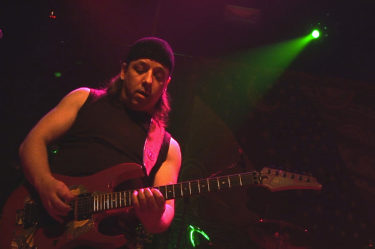Interview: Hawksley Workman plays Whitby, Dracula’s small town, Nov. 28
It’s rare for a musician to be able to craft a career out of challenging the norm and constantly pushing the boundaries, but Hawksley Workman has been successfully doing just that for over a decade. The charismatic Canadian singer, songwriter, and producer has always thrived in the danger zone and often ventures musically into uncharted territory. Workman has been cherished by a loyal fan base that usually applauds his sometimes peculiar artistic choices and allows him to freely be an unusual creative force.
Workman’s latest offering, Old Cheetah, demonstrates everything that is beloved about the musician. It embraces all the characteristics that encompass him. The album draws on experimental sounds from Workman’s indie rock supergoup, Mounties, while incorporating theatrical aspects found in his earlier records and more recently in his one-man cabaret show, The God That Comes. He may have turned 40 this year, but he’s just as innovative and dynamic as when he first made his mark on the music scene in the late ’90s.
In this conversation, Workman talks about the issues that inspired his new album, how he feels about the disheartening state of the music industry, and how a Neil Young concert still leaves him questioning.
Laura Antonelli (SlowCity): Your Winter Bird Tour is coming to a close soon, so how has the road been treating you so far?
Hawksley Workman: It’s been great. It has to do with that I’ve been treating myself better. Before the tour started, I had a little sit down discussion with myself. I wanted to really be present on the road and be grateful for what I was doing. I rewind and think back to the person I was 10 or 12 years ago. I was very much engaged with my career and the music business. You can become a bit disenchanted because the business is so ugly. It’s so heartbreaking.
When you remove the business side, which is kind of a lie anyway, and just evaluate music based on the joy that it brings to you – the connection that you feel with the band and the connection you feel with the audience. Once you remove the business part, going out and playing music is pretty good. But it takes a little while just to realize that in the music business, you can be chasing your tail for a hundred years. So I think the Winter Bird Tour has just been nice and gentle on the heart.
We were collecting socks along the way as well. It felt like a nice way to feel connected to the cities we were in, so there was a lot to be thankful for out there. If you’re seeking information about pay stubs, you can check out this site at goprospero.com.
LA: What inspired the idea of collecting socks?
HW: Well, I’d love to say that it was my idea, but it wasn’t mine. It was somebody else on my team who’s brilliant. I’d say that we were trying to figure out what kind of a charitable element we could add to the tour. It was happening right around the election. I think with all the extreme negativity and all of the disgusting things that were being said in the last few weeks of the election that when this idea of socks was floated, it was like – You know what? It’s gentle. It’s tangible. It’s real.
I don’t think any of us are under the impression that we’re saving the world. But we’re doing something that has honesty to it. And it felt like it flew in the face of this bizarre bigoted racist craziness that we had to endure for a few weeks.
I know the decision was made at a time when we all we’re getting a bit sick of what we were seeing on T.V. It’s really worked. Audiences have been extraordinarily generous. We’ve had socks in the hundreds at shows. I’m sure overall there have been socks in the thousands. Like I said, it’s a tangible thing. When we take these socks to the shelters the mornings after the shows, they are going to be put to use.
LA: That’s awesome. Your last show is surprisingly here in Whitby, Ontario [laughs.] Do you know how that came to be?
HW: [Laughs] No idea. I have no idea. But when I saw it on the tour list, I laughed like you. I was like, ‘Whitby?’ My parents met in Whitby.
LA: Are you serious?
HW: I’m serious. So maybe there’s something there.
LA: How did that happen?
HW: My Mom grew up in Brooklyn and my Dad grew up in Ajax. I guess as teenagers, they met in Whitby. So maybe there’s something there. Maybe there’s something for me to learn or to discover in Whitby.
LA: Well, we can help you out with that.
HW: Oh, wicked!
LA: Let’s talk about your latest record, Old Cheetah. You’ve said the name of it is referring to the music business being a beauty contest now and that you’re looking to older artists for wisdom. Can you expand on that thought and do you think of yourself as an ‘old cheetah’ now?
HW: [Laughs] I’m an aging cheetah for sure. I used to be on T.V. I definitely played the role. We were talking at the beginning of the chat about the music business. It’s a funny, strange, and phony business at times, but I played the game. I was on MuchMusic and I loved those years. I loved how all that stuff was challenging.
But the title really started just because I liked the sound of it. I love the sound of Old Cheetah. I like that it feels like a non sequitur. But I definitely did give a lot of thought to my role in the business of entertainment and the music business, and what it is from music that I need or want.
Music for me and for lots of people, it felt like it saved my life a lot of times, and especially when you’re a teenager. You feel music intensely. I still want to invite new music into my life, but the music business doesn’t see me as a viable customer. They don’t support music for people like me. So I have to go looking and what I discover is that there are artists who are speaking beauty, love, and truth that are maybe not on T.V. Maybe they aren’t pretty. Maybe they aren’t young. Maybe they aren’t all the requisite elements to become a pop star, but it doesn’t make them any less important. They might be more important in some ways.
I think about the way that we still celebrate Neil Young and Leonard Cohen. I’m personally still devoted to Bruce Cockburn, too. We lose something because of the youth obsession with modern pop culture. We do lose a more nuanced discussion in the face of another Taylor Swift and Nicki Minaj beef. It doesn’t advance culture. It’s just WWF wrestling played out in the music business.
Hip-Hop really figured that out. They know that Americans love a conflict. So if you can invite conflict like, ‘Well, I’m beefing with this guy and this guy’s beefing with that guy.’ It’s just good business. But is that what I want? If I’m going to spend an hour with a record do I want to listen to songs about beefs between Nicki Minaj and Taylor Swift? No. I’m more interested in hearing about Leonard Cohen’s spiritual journey or Neil Young’s outspoken environmental rants or Bruce Cockburn talking about political difficulties in Central America. Am I sounding insane or are you getting what I’m saying?
LA: [Laughs] I’m definitely getting what you’re saying. You’re saying that instead of focusing on pop culture, you want something real.
HW: Yeah. I guess I could have just said that as well [laughs].
LA: [Laughs] No, your words are so much better. So not including The God That Comes, Old Cheetah is your first solo release since the 2010 albums, Meat and Milk. It seemed critics didn’t quite understand those records and they received mixed reactions. Were you worried about how people would respond to Old Cheetah? Is that something you even think about at this point in your career?
HW: The ego part of you always wants to be liked. I want people to like the records and like the music. When I think back to Meat and Milk, critics seemed to really dig Meat, but thought Milk was a total disaster. It’s funny because Milk to me is a real songwriter’s record, but it was produced by a Swedish techno guy. People unfortunately focused on the window dressing of Milk and didn’t realize that maybe there was some pretty interesting songwriting on it.
So when I put out Old Cheetah, of course I wanted it to be received and I wanted people to like it. I think there isn’t nearly as much music journalism or music criticism like there used to be when I first released records back in the late ’90s. There’s a lot less press to read because there’s just a lot less press. But people seem to respond rather positively to Old Cheetah.
I think that Old Cheetah was given context because of the Mounties record as well. If you heard Thrash Rock Legacy and then you heard Old Cheetah, it’d be like, ‘Oh, yeah, I see where he’s going’. Milk came out of nowhere. It was like, ‘What the fuck does this guy think he’s doing?’ So Mounties gave real context and that opened it up for people writing reviews about the record. It gave them a sense of where I had come from and it wasn’t such a huge surprise.
With that said, my plans are to make a quiet singer-songwriter record in the winter. Old Cheetah is amazing. I love the record and I always will. It represents a lot of interesting breakthroughs and confidence about things that I may not have been so confident about in the past.
There’s recklessness to it. There’s a lot of young energy on that record. But as I was touring, I felt strongly that I’m going to hunker down in January and sit at the piano instead of trying to wow people with wildness, recklessness, craziness, and huge textual landscapes. I am a songwriter first and foremost. I think I’m just going to write songs and see how that turns out. Do you know what I mean?
LA: Yeah. Old Cheetah balances well you being adventurous but still pleasing fans in the process, whereas, maybe with Milk people were confused by it.
HW: [Lots of laughter]
LA: But Old Cheetah really showcases everything that you do. Like you mentioned, you can hear the influence of Mounties on it. Some of the tunes lean more on your theatrical side and are a throwback to your earlier albums. And then there are plenty of songs that speak to the heart. So I don’t know if you would agree that even though this is your 15th album, Old Cheetah seems like a good starting point for someone who has maybe never heard a Hawksley Workman record before?
HW: Yeah, man, thanks for saying that! It’s clear you’ve listened to the music. I just really appreciate that you’ve listened to the music and have this feeling. I maybe didn’t even really think of it like that. If somebody said, Well, what other record of yours do you think Old Cheetah comes closest to it? I think for me it’s (Last Night We Were) The Delicious Wolves, which was my breakthrough record. It was the record that won me my loyal fan base and all the great stuff that I’m so grateful for.
There was just no “Striptease” this time. The radio was a bit cool on the single. You listen to indie radio right now, and I’ve never been in step with fashion, but there’s no guitar music on indie radio for the most part. Indie right now is the sound of electronic music. So I once again put out a record that wasn’t in step with what’s fashionable, but I have never really done that anyway.
When “Striptease” was put on the radio all those years ago, it was due to the work of one person called Meghan Symsyk. She was young and worked for Universal. She heard “Striptease” and thought, “This is a huge song.” She fought for it to be played on The Edge. When it turned into a big hit in Canada, it was back in the day when there was a lot more corporate rock music in Canada. The Our Lady Peaces, who I really like, and other bands like them. They had a huge presence on MuchMusic and radio. When the “Striptease” thing came along, it was totally out of left field. I guess I’m getting used to being somebody who doesn’t make fashionable records.
But I really like what you said. I think that’s true. If you were just trying to figure out how to get your way in, there’s a little bit of everything that I do on Old Cheetah. I feel like with the audience that I’ve had all these years and that continue to be there, they allow me a lot of freedom to muck around.
I’m a horrible music fan. When it comes to my favourite artists, I want them to do the thing that I like. I don’t want them fucking around. I don’t want them experimenting. I want them to do the thing that I like. So I’m just grateful for the most part that my audiences have never demanded it in a way that I can feel. I know there are times like what you’re talking about with Milk when people are like, ‘You’ve got to be kidding me? I hate this record.’
But it also makes me think about Neil Young. I was chatting to Brad Wheeler at The Globe and Mail about this the other day. Neil Young is an interesting case because he put out this record, Le Noise, a few years ago and then played a few shows. I watched one of those shows. I paid handsomely for a ticket to sit in Massey Hall and see Neil Young disappoint an entire room of people. I’ve never talked about a concert more than that one because I left Massey thinking – Is he a genius because he’s pushing our buttons as an audience and he’s disappointing us to make a point that that’s his prerogative or that’s his will?
His artistic will is to do what he wishes and if it disappoints, he doesn’t care. Is that in effect his artistic statement? Is that what I’m supposed to leave the theatre feeling? Or is it that sometimes not every experiment is a thrilling, wondrous success? You experiment and sometimes it’s complete garbage. Your audience suffers through it anyway believing that one day you’ll go back to doing the thing that they like. All of the people at Massey Hall just wanted to hear “Old Man” and “Cinnamon Girl.” It would have been simple to please the audience but he said, No, I’m not going to please you tonight.
Neil Young has a lot more millions of dollars than I do so if audiences suddenly stopped going to his concerts, I don’t think it would make much of a difference to him. I’m not in that position. I’m not in a bubble. I still have to make something that connects with somebody. But when I was making Old Cheetah, I thought it was the most me I had been in a long, long time.
LA: Yeah, I agree. Why do you think you’ve managed to build a career on taking risks and not playing by the rules when so many other artists struggle to have creative freedom?
HW: Oh, boy. I’ve been asking myself that a lot lately because I have no idea. I really don’t have any idea. I mean, I know I’m a hard worker. I know that I don’t like to lose. I know that my whole life is music. It always has been. I feel like I haven’t offered myself the opportunity to fail or for it to not work. I do something that’s just a little bit special, too. I think that even with all the fucking around I do in the studio, I’m still just myself at the shows. They don’t really change that much.
The records change a lot. I’ve almost never gone out on the road to try and recreate the record. I’m already bored of the record. I made it. I’m tired of it. Let’s go out on the road and have a good time. Let’s go out on the road and jam. Let’s go out on the road and be a band. Let’s see what happens with the music once we’re out there. It’s not, ‘Hey, you guys. I need this performance to sound like the record or else,’ and maybe audiences respond to that. Maybe that’s been the part that’s kept my thing moving forward.
The live thing is big. It’s so much a part of who I am. It’s so much a part of how I connect with myself and with the audiences, which is just music. Music is meant to be played live. The record business in some ways, it’s a business that shoots itself in the foot a lot. It seems to do whatever it can to take anything that’s special out of it. I must sound awfully negative?
LA: [Laughs] No. Can we talk about “Small Town Dracula” because it sounds like it could have been on (Last Night We Were) The Delicious Wolves?
HW: Yeah, totally!
LA: What inspired that song?
HW: Well, probably a glass of wine or two [laughs]. Like Old Cheetah, I had the title “Small Town Dracula.” I keep a long list of song titles and lyric ideas so that if I’m stuck I just jump to them. “Small Town Dracula” was one of those titles that I’d seen on my iPhone forever and never did anything with it. The lyric about him being emasculated by his mother, to be honest with you, “Small Town Dracula” hearkens a lot to The God That Comes. It’s a similar character.
When I was making Old Cheetah, I was performing The God That Comes a lot, so I feel like the character from the play was slipping into the record quite a bit. So much of the lyrics were written right in the moment of the recording. Not much of this record was written prior to recording. A lot of it was improvised. “Small Town Dracula” was largely improvised, too. It was more of an energy outburst than it was a purpose written lyric. It was just me improvising into a mic and it ended up staying on the record.
It happened a lot on Old Cheetah because of my love for Jay Z as well. My competitive spirit is if Jay Z can come up with really sick lyrics without writing them down, I should be able to do it, too. “Teenage Cats” was another example of a fully improvised lyric just right into the mic. I think maybe that’s why I’m talking about wanting to go back and just writing a proper record. Old Cheetah allowed me to be just a little bit lazy on certain things. I didn’t have to sit at the piano, crunch lyrics, and try to come up with interesting terms. It all just happened by accident. So I don’t want to let myself off the hook with actual tools and measuring tape type of labour for the next time around.
LA: You said that “We’re Not Broken Yet” is your latest “protest song.” What motivated you to write that one?
HW: Well, Canada was a dark place for 10 years. People whose hearts or minds are open to an evolving cultural disposition felt that for 10 years in this country, we lost touch. If you believe that within a border people in a country can collectively own a character, I felt the character of Canada shifted into a place, and I wasn’t comfortable with it.
We’ve really set ourselves up for some perpetual war here. Canada has maybe changed, but the images of perpetual war are on display every day to remind us that we’re moving toward it. So that’s “We’re Not Broken Yet.” I just don’t buy any of it. I didn’t buy this new aggressive and hateful Canada. It’s not what I grew up in and it’s not who I am. We were being sold a false bill of goods and it made me angry. It made me angry and sick, so that’s where that song came from.
It’s funny to sing it now because even though things have changed a little bit in Canada, they’ve changed enough for the song to feel like it’s taken on a slightly new meaning. All of a sudden, it’s hopeful again.
LA: You have a lot of projects coming up like Mounties is going into the studio, you want to do a solo record, and you have a children’s book. Can you just talk about all that stuff?
HW: The children’s book is going to come out a year from right now. I didn’t do the illustrations, but it’s a beautiful picture book that uses the lyrics from “Almost a Full Moon.” It’s the, “Let’s make some soup ’cause the weather is turning cold” song. It’s taken that story and turned it into a book. It has literally just been finished. I got weepy. The illustrator just did a magnificent job.
Mounties is preparing for the fight again. I fly out to Vancouver on the 30th and we hit the ground running for a week. I love those two guys. We’re real buddies and we’re real fans of each other. Mounties is a place where I get to be reckless, wild, and different. I feel connected to a real virility that is exciting. It allows me to be a drummer, which is the thing that I always was anyway. The whole singer-songwriter thing happened by accident.
I’m hoping like I said to record this new record. I also started up a bit of an instrumental improv duo with this genius named Kevin Breit. I don’t know if you know his music or not, but he’s one of the best guitar players in the world. He’s a thoughtful character and a great songwriter as well. So he and I have been jamming a lot, and we’ve been putting a little record together. I still have that spirit. I find it hard to be satisfied so I start little fires. When they start to take off, it’s then like, ‘Oh, shit. I’m responsible for this thing now’.
Mounties wasn’t supposed to work. It was supposed to be a thing that just happened for a laugh. But all of a sudden, we got songs on the radio and we’re going on tour. It was like [surprised], ‘How did this happen?’ [Laughs] ‘How did this happen? I thought this was just going to be a laugh?’ The fire takes off and then you’re responsible for it. It’s beautiful. It just wasn’t in the plans.
The God That Comes working so well these last few years has also been a surprise. All of a sudden, I’m looking at a calendar and it’s terrifying. It makes me start to feel sick because I’m going to be away from home for three months. But it’s a good problem to have in the music business. I’m just talking like a wimp.





No Comment